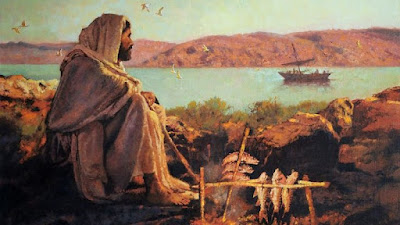His words "Totus tuus ego sum” became well known in the last few decades, when they were taken by Pope St. John Paul II as his papal motto. The sainted Pope dedicated his papacy entirely to Mary, and encouraged members of the Church to turn to her as well.
The Easter Season feast of Louis Marie de Montfort provides a wonderful opportunity to reflect upon the need for a strong devotion to the Blessed Virgin Mary if we truly wish to experience the fullness of Christian life.
St. Louie Marie de Montfort wrote: “Mary is the fruitful Virgin, and in all the souls in which she comes to dwell she causes to flourish purity of heart and body, rightness of intention and abundance of good works. Do not imagine that Mary, the most fruitful of creatures who gave birth to a God, remains barren in a faithful soul. It will be she who makes the soul live incessantly for Jesus Christ, and will make Jesus live in the soul”.
I love those words, Mary helps us “to live incessantly for Jesus Christ” and makes “Jesus live in our souls”. That’s certainly what we find the apostles doing in our first readings all throughout Easter so far—living incessantly for Jesus, making Jesus the primary and all encompassing animating force in their lives.
That was certainly the lesson the Lord was teaching to Nicodemus last week—that to be born again by water and the spirit means to start a new life distanced from sin, a life seeking above all the holy will of God.
And that’s certainly what the Lord is teaching in the Bread of Life discourse this week. “Whoever eats my Flesh and drinks my Blood remains in me and I in him.” God desires to make his dwelling in us.
And our Lady helps that happen. She is the auxilium Christianorum, the help of Christians. She helps Christians grow in the grace of God, to obtain virtue, to encounter God more deeply in the Sacraments of the Church, especially the Eucharist by which Jesus dwells in us, like the infant Christ dwelled in the womb of the Blessed Virgin.
One of the tasks of the Legion of Mary is to draw people to the Sacraments of the Church; souls who have wandered, souls who have become lukewarm, souls who have never yet responded to the grace of God to accept the faith. And the members of the Legion of Mary and all of us, do well to study the words of today’s saint, St. Louie Marie de Montford, and have a devotion to him. Because if Our Lady will help all those who turn to her find and love her son, St. Louie Marie de Montfort will help all those who turn to him to find and love our Lady.
St. Louie’s feast prepares us well for the upcoming month of May, dedicated to our Lady, in which we are to increase the fervor of our Marian devotion, that the abundant life of Christ might increase in us and willingly be spread by us for the glory of God and salvation of souls.
- - - -
For deeper Marian devotion amongst all Christians, that the Church may more deeply share in Mary’s Easter joy over the Resurrection of her Son.
For all mothers, that they may find in Mary the example and strength to carry out their vocation of love, and that all sorrowful mothers may know the consolation and peace of God.
That through Immaculate Mary, Queen of Peace, hatred, violence, and cruelty will cease in the world.
That from the moment of conception all children will be preserved from bodily harm; for the overturning of unjust laws permitting the destruction of innocent life; and that the minds of all may be enlightened to know the dignity of every human life. We pray to the Lord.
That the sick may draw strength, consolation, and healing by turning to Mary, who intercedes for us from her place in heaven

















